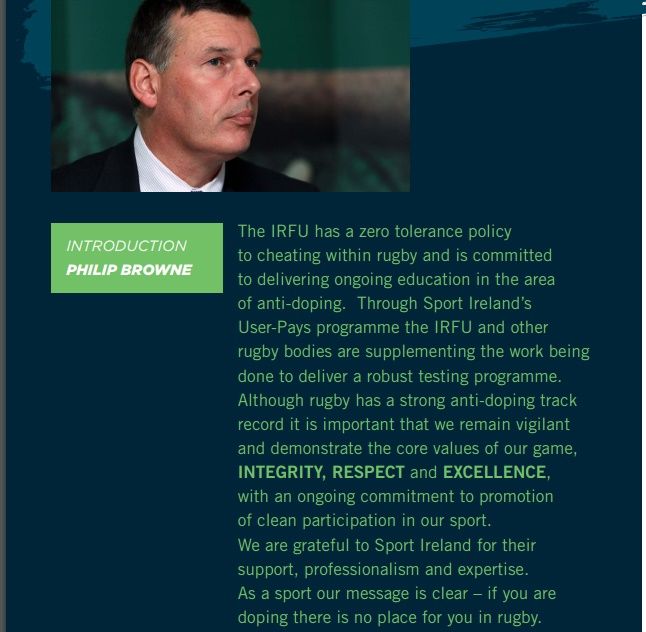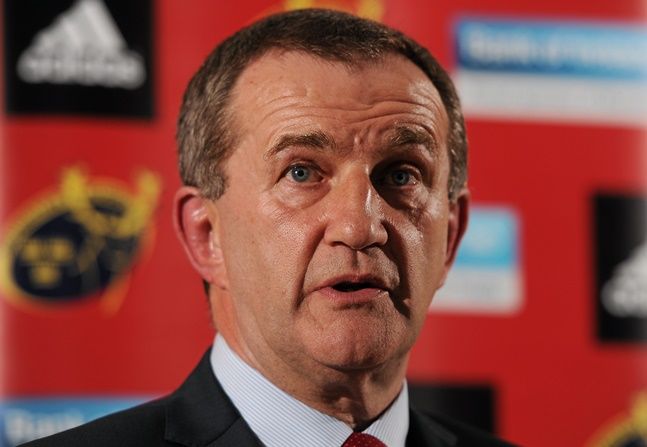

Share
18th January 2018
08:37am GMT

"The IRFU has a zero tolerance policy to cheating within rugby and is committed to delivering ongoing education in the area of anti-doping," IRFU CEO Philip Browne wrote in the union's 2015/16 anti-doping report which showed 267 tests in Irish Rugby with no adverse findings. "Although rugby has a strong anti-doping track record it is important that we remain vigilant and demonstrate the core values of our game – integrity, respect and excellence. We are grateful to Sport Ireland for their support, professionalism and expertise. "As a sport our message in clear – if you are doping there is no place for you in rugby."https://twitter.com/SportsJOEdotie/status/953615126502002688 Is the message clear though? Is the message 'if you are doping there is no place for you in rugby'? Or is it 'if you serve a two-year ban and we're stuck for a second-row, there's a place for you in Irish Rugby?' Browne moved to make the union's stance clear on this issue on Wednesday at the announcement that Aviva are continuing their sponsorship of Lansdowne Road until 2025. He was clear in the fact that a zero tolerance approach had existed in 2016, but on Wednesday, it seemed as if the union would now be reviewing their policies instead of taking a hardline stance against bringing in any more convicted dopers into Irish Rugby. https://twitter.com/Cumoski/status/953621981747957760
 Putting the philosophical questions about acquiring a convicted doper aside, which has returned an overwhelming response of 'this is not good for the short term or long term future of Irish Rugby', why open your organisation up to this type of criticism again in the future?
The avalanche of criticism from the media and former players. The hypocrisy of the statements. The mere notion that anyone in the future can point to this week as an abject failure should a similar situation arise again in the future.
From an optics point alone, and leaving aside for a brief second the morale idea that maybe you shouldn't hire convicted dopers in a contact sport, why would you not eradicate any possibility of a Grobler repeat ever happening again?
Maybe Browne's 'I don't think we are going to bring in drug cheats in the future' is meant in a similar vein to a pedestrian's 'I dont' think I'll walk in front of oncoming traffic today', in that it should be a blatantly straightforward decision, but maybe it also leaves the door open to a future Gerbrandt Grobler, where the IRFU can hide behind the defence of we said 'we'd review our policies' or 'we never said we wouldn't'.
Here's hoping this week acts as a turning point in educating future players and deterring them from substance abuse, and not promoting the fact that the chief executive of the IRFU failed to categorically deny the possibility of employing known dopers in the future.
Putting the philosophical questions about acquiring a convicted doper aside, which has returned an overwhelming response of 'this is not good for the short term or long term future of Irish Rugby', why open your organisation up to this type of criticism again in the future?
The avalanche of criticism from the media and former players. The hypocrisy of the statements. The mere notion that anyone in the future can point to this week as an abject failure should a similar situation arise again in the future.
From an optics point alone, and leaving aside for a brief second the morale idea that maybe you shouldn't hire convicted dopers in a contact sport, why would you not eradicate any possibility of a Grobler repeat ever happening again?
Maybe Browne's 'I don't think we are going to bring in drug cheats in the future' is meant in a similar vein to a pedestrian's 'I dont' think I'll walk in front of oncoming traffic today', in that it should be a blatantly straightforward decision, but maybe it also leaves the door open to a future Gerbrandt Grobler, where the IRFU can hide behind the defence of we said 'we'd review our policies' or 'we never said we wouldn't'.
Here's hoping this week acts as a turning point in educating future players and deterring them from substance abuse, and not promoting the fact that the chief executive of the IRFU failed to categorically deny the possibility of employing known dopers in the future.
 However, despite Browne's lack of clarity, the decision to sign Grobler was not his, but rather a choice made by IRFU Performance Director David Nucifora and Munster CEO Garrett Fitzgerald, as it is understood that Browne was not aware of the decision at the time.
We have heard from Browne but should we now demand answers from Nucifora?
Maybe, but given that it has only been three weeks since his 21-year-old daughter Katie Frances passed away, for me, personally, and I hope I would speak for the rest of the media when I say that we can wait for those answers as he grieves the loss of something more important. Life.
Fitzgerald, however, has failed to go on the record. van Graan, O'Mahony and Murray have all addressed the issue before the province's CEO. That is unacceptable. None of the aforementioned had a say in the signing of Grobler as the player was hired under former Munster Director of Rugby Rassie Erasmus.
van Graan, O'Mahony and Murray should not have had to field questions that Fitzgerald ultimately created and avoided.
Silence is deafening, but in Browne's case, his words also hurt the ears. There is no need to consider and review policies. You don't have to judge each case on its merit.
If a player, foreign born, naturalised, or actually Irish born and bred, has been proven to have used performance enhancing drugs, you do not reward that player with a professional contract in Irish Rugby. They can look elsewhere. They will have suitors.
That's the policy. That's a zero tolerance approach. You kill a snake by cutting off the head, not by considering your position on whether to pull at its tail.
However, despite Browne's lack of clarity, the decision to sign Grobler was not his, but rather a choice made by IRFU Performance Director David Nucifora and Munster CEO Garrett Fitzgerald, as it is understood that Browne was not aware of the decision at the time.
We have heard from Browne but should we now demand answers from Nucifora?
Maybe, but given that it has only been three weeks since his 21-year-old daughter Katie Frances passed away, for me, personally, and I hope I would speak for the rest of the media when I say that we can wait for those answers as he grieves the loss of something more important. Life.
Fitzgerald, however, has failed to go on the record. van Graan, O'Mahony and Murray have all addressed the issue before the province's CEO. That is unacceptable. None of the aforementioned had a say in the signing of Grobler as the player was hired under former Munster Director of Rugby Rassie Erasmus.
van Graan, O'Mahony and Murray should not have had to field questions that Fitzgerald ultimately created and avoided.
Silence is deafening, but in Browne's case, his words also hurt the ears. There is no need to consider and review policies. You don't have to judge each case on its merit.
If a player, foreign born, naturalised, or actually Irish born and bred, has been proven to have used performance enhancing drugs, you do not reward that player with a professional contract in Irish Rugby. They can look elsewhere. They will have suitors.
That's the policy. That's a zero tolerance approach. You kill a snake by cutting off the head, not by considering your position on whether to pull at its tail.
Explore more on these topics: